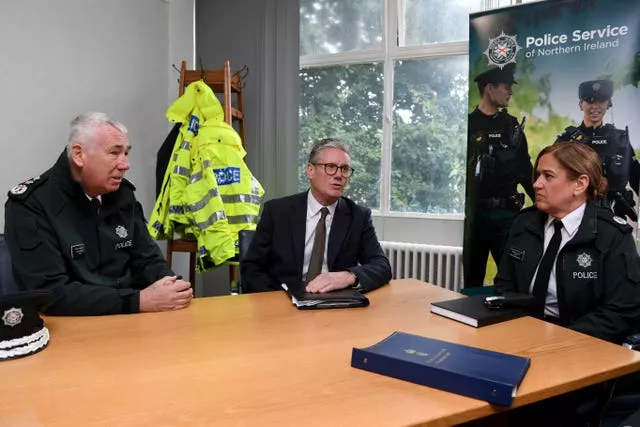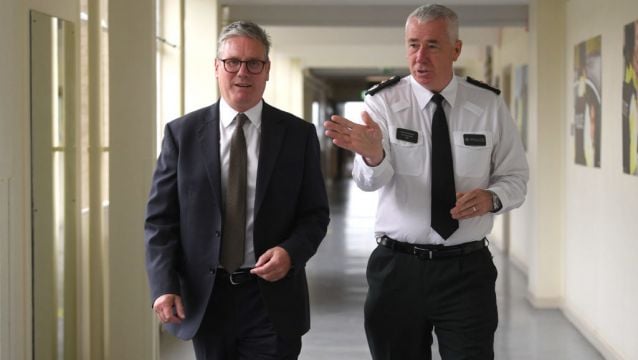UK prime minister Sir Keir Starmer has held discussions with Northern Ireland’s police chief over concerns that the PSNI is chronically underfunded.
Mr Starmer met chief constable Jon Boutcher at the Police Service of Northern Ireland’s training college in Belfast on an engagement that also saw him speak with officers involved in responding to the recent bouts of race-related violence and disorder in the region.
The UK prime minister also met with representatives of ethnic minority groups living in Northern Ireland to hear their concerns amid the upsurge in hate crime attacks.
The Labour leader branded the violence as “intolerable” and not representative of the Northern Ireland he knows.
Prior to the disorder of recent weeks, Mr Boutcher had been flagging grave concerns about the PSNI’s financial situation, insisting he does not have the necessary resources to police Northern Ireland effectively.
Those funding pressures have intensified following the race related unrest, with the PSNI facing a sizeable bill after making a mutual aid request for backup for 80 officers from Police Scotland.
Mr Boutcher has insisted Stormont does not get enough money to sustain public services in Northern Ireland, including the PSNI.
His officer headcount remains more than 1,000 officers below recommended levels.
Those issues were raised during his meeting with the UK prime minister at the Garnerville college on Monday.

Mr Starmer said one of the main purposes of his visit was to say thank you to the frontline officers involved in quelling the disorder.
“It’s very important for the Prime Minister to come here to talk to the frontline officers face-to-face and humbly say thank you for what they and their colleagues have done. As I say, many of them injured,” he said.
“But, of course, we’ve also had discussions about resourcing, about capability.
“Mainly, of course, that’s a devolved issue, as I think everybody understands, but, nonetheless, we’ve had that discussion about what further support can go in, whether that’s financial or whether it’s in other ways, in terms of making sure the system works better.
“But my main purpose was to come and say thank you. But, of course, those discussions have been had, as you would expect them to be had about the wider support, both immediately and in the medium and long-term.”
At least 20 police officers were injured in a spate of violent incidents across early August in Northern Ireland.

Bricks, petrol bombs and other missiles were thrown at officers as anti-immigration protests brought wider unrest to areas such as Belfast and Derry.
Cars were set alight and a number of businesses were severely damaged.
Elsewhere, a petrol bomb was thrown at a mosque in Newtownards.
Dozens of people have been arrested and charged with offences such as rioting and racially-motivated hate crimes.
Young children were also involved in some of the street disturbances.
Mr Starmer said “big asks” had been made of the police dealing with the violence.
“They step up and they deserve our thanks,” he said.
“I’ve also had the chance to speak with the PSNI senior leadership about the challenges that they face and the support that they need. And then, third, and very importantly, to speak to some of the communities most impacted about the fear that they have, the anxiety that they have about the recent disorder.
“The disorder is intolerable. It is incapable of justification. It’s clearly racist and it does not represent the modern, forward-looking Northern Ireland that I know that this place is.”
The prime minister said he would work with the PSNI and all communities to address the disorder and its consequences.
Speaking after the meeting, Mr Boutcher warned that the violence that occurred in Belfast in recent weeks could flare up again, as he made a fresh plea for more funding.
He insisted he would not allow the PSNI “to decay”.
“By highlighting the issues, as in the numbers of officers we have lost or the budget that we have now got, the arguments are compelling in themselves,” he said.
“By continually making those arguments and how challenging it was to deal with the disorder, I think we held our own. Had we got more, had it (disorder) continued, and it might still, we can’t keep pace with other forces in England and Wales because they have had a 20 per cent uplift in resources.
“We have been left so far behind. We have to get the resources in to allow us to police Northern Ireland – our police officers are from our society – in the way that everyone deserves.”
Asked about the condition of the injured police officers, Mr Boutcher said: “The injured officers are okay. There are some surgeries to occur and I think the nature of what they face has, even for some of those seasoned officers, taken them aback.
“But they’ll all be okay. There were some really near misses to very serious injuries.”

The chief constable said the PSNI needed another 1,200 officers.
“I’ve had some real issues around the wellbeing of police officers, so what I am trying to do, with every bone in my body, is to explain the seriousness of the situation, of the PSNI police officer numbers, to those that can make the difficult decisions around making sure that we are funded appropriately to get the officers that we need,” he said.
“We should be at 7,500 and we are 1,200 below that.
“We have to arrest this decline because if we don’t the consequences could be dire.
“We are dangerously beyond the point of where we should be.”
Asked if the PSNI can continue to deliver the current service without more funding, he said: “No, we can’t, quite simply.”
Mr Boutcher also said he wanted to see the same “speedy justice” dealing with riot offences in Northern Ireland as that seen in courts in England.
He said a total of 39 people have been arrested in relation to the recent riots and disorder in the city.
“My concern, and it’s not a criticism, it’s an observation, is the criminal justice aspect,” the police chief said.
“It’s much slower here and I want to see the same speedy justice that we have seen in England with regard to these riot offences.”







